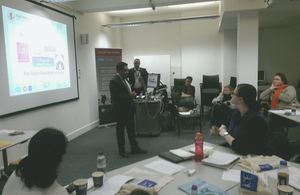Lord Ahmad launches First World War battlefields legacy project
New project designed to encourage pupils who have visited the First World War battlefields to share their experience with their local communities.

Launch of the project.
Lord (Tariq) Ahmad of Wimbledon launches today (29 January 2015) a new project designed to encourage pupils who have visited the First World War battlefields to share their experience with their local communities.
The Legacy 110 project will encourage the 8,800 students who are visiting the battlefields of Northern France and Belgium through the government-funded Battlefields Tours Programme to share their experiences with 110 other people.
If every student that goes on a tour achieves the Legacy 110 target, 880,000 people will have gained a deeper understanding of the First World War - the same as the number of British and Colonial soldiers who died during the war.
Speaking at the launch event at the Institute of Education, Lord Ahmad said:
People from all faiths and backgrounds fought for Britain during the First World War and over the next 3 years young people from every school in the country will learn about the sacrifices made by individuals and their communities to protect our liberty and our shared British values.
The men who gave their lives during the War will always be heroes and it is our responsibility to ensure their deeds are not forgotten. The Legacy 110 project will bring communities together to remember all of our shared history and help ensure that the next generation keep the memory alive of those who fought for our freedom.
Each student who successfully completes a Legacy 110 project will receive a certificate and specially-commissioned Legacy 110 pin badge.
To qualify, projects must be added to a designated online map detailing how many members of the local community have been engaged. Projects should also be included on the school website.
The Battlefields Tours Programme provides an opportunity for 2 pupils and 1 teacher from every state-funded secondary school in England to visit the Western Front battlefields of northern France and Belgium and take part in remembrance ceremonies over the 4 years of the First World War Centenary.
The project - part of the government’s centenary education programme and delivered by UCL Institute of Education and school tour operator Equity - allows secondary school pupils to learn at first hand about the sacrifices made by the troops and the personal stories behind the soldiers of the First World War.
The First World War features in the history curriculum for 11- to 14-year-olds and can also be taught at primary.
Further information
The Legacy 110 project encourages participating pupils to share their experiences of visiting the battlefield sites of the Western Front through developing post tour community projects. These projects could include a study of local soldier, the role played by women, the contribution of Commonwealth forces, or even the impact upon sports such as football and rugby.
Legacy 110 is designed to encourage pupils to reach out into their local communities and create a lasting legacy for the First World War Centenary.
In return pupils will receive certificates, badges and the best projects will get national recognition through the UCL Institute of Education’s programme website and special events designed to celebrate their achievements.
To find out more visit the UCL Institute of Education and Equity Battlefield Tours website.
Office address and general enquiries
2 Marsham StreetLondon
SW1P 4DF
Contact form https://www.gov.uk/gui...
General enquiries: please use this number if you are a member of the public 030 3444 0000
If your enquiry is related to COVID-19 please check our guidance page first before you contact us - https://www.gov.uk/guidance/coronavirus-covid-19-guidance-for-local-government.
If you still need to contact us please use the contact form above to get in touch, because of coronavirus (COVID-19). If you send it by post it will not receive a reply within normal timescale.
Media enquiries
Email newsdesk@communities.gov.uk
Please use this number if you are a journalist wishing to speak to Press Office 0303 444 1209